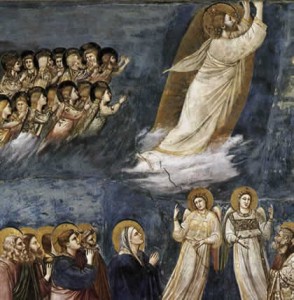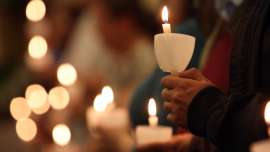
Knowing God
Jesus has been taken up into heaven as we begin today’s First Reading. His disciples – including the Apostles and Mary – return to the upper room where He celebrated the Last Supper (see Luke 22:12).
There, they devote themselves with one accord to prayer, awaiting the Spirit that He promised would come upon them (see Acts 1:8).
The unity of the early Church at Jerusalem is a sign of the oneness that Christ prays for in today’s Gospel. The Church is to be a communion on earth that mirrors the glorious union of Father, Son and Spirit in the Trinity.
Jesus has proclaimed God’s name to His brethren (see Hebrews 2:12; Psalm 22:23). The prophets had foretold this revelation – a new covenant by which all flesh would have knowledge of the Lord (see Jeremiah 31:33-34; Habakkuk 2:14).
By the new covenant made in His blood and remembered in every Eucharist, we know God as our Father. This is the eternal life Jesus promises. And this is the light and salvation we sing of in today’s Psalm.
As God made light to shine out of darkness when the world began, He has enlightened us in Baptism, making us new creations (see 2 Corinthians 5:17), giving us knowledge of the glory of God in the face of Christ (see Hebrews 10:32; 2 Corinthians 4:6).
Our new life is a gift of “the Spirit of glory,” we hear in today’s Epistle (see John 7:38-39). Made one in His name, we are given a new name – “Christians” – a name used only here and in two other places in the Bible (see Acts 11:16; 26:28). We are to glorify God, though we will be insulted and suffer because of this name.
But as we share in His sufferings, we know we will overcome (see Revelation 3:12) and rejoice when His glory is once more revealed. And we will dwell in the house of the Lord all the days of our lives.
Saint Columbanus (563-615)
Instruction 1
Who can penetrate the inexpressible and incomprehensible being of the Most High God? Who can sound the depths of God?… For who is God? Father, Son and Holy Spirit: God is one. Ask nothing more concerning God. As for those who want to know the deep things of God, let them begin by reflecting on the natural order.
Rightly, in fact, has understanding the Trinity been compared to the depths of the sea, of which God’s Wisdom has said: “What exists is far reaching; it is deep, very deep: who can find it out?” (Eccl 7,24)… Just as the bottom of the sea is invisible to human sight, so the divine Trinity remains ungraspable by human understanding. Hence, if someone should wish to understand what he ought to believe, let him not think himself better able to do it by reasoning rather than faith since the divine wisdom you are looking for in this way will only withdraw even further away.
So seek out this pre-eminent knowledge, not through disputation but by leading a life of perfection, not with the tongue but through the faith that springs out of the simple heart and is not the result of knowledgeable speculation. For, if you seek what is ineffable with reasoning, it will escape you even further; if you seek by means of faith, Wisdom will be standing where she dwells: at your gates (Pr 1,21). And where she stands she can be seen, even if only in part. Truly, she is attained the instant you believe in what is unseen while accepting that you cannot understand it. Since God is invisible we have to believe in him. Nevertheless, God can be seen after a fashion by the pure heart (Mt 5,8).
Pope Benedict XVI
Homily, June 5, 2011
We have recently celebrated the Ascension of the Lord and we prepare ourselves to receive the great gift of the Holy Spirit. In the first reading, we saw how the apostolic community was united in prayer in the Upper Room with Mary, the mother of Jesus (cf. Acts 1:12-14).
This is a picture of the Church with deep roots in the paschal event: indeed, the Upper Room is the place where Jesus instituted the Eucharist and the priesthood during the Last Supper, and where, having risen from the dead, he poured out the Holy Spirit upon the Apostles on the evening of Easter Sunday (cf. Jn 20:19-23).
The Lord directed his disciples “not to depart from Jerusalem, but to wait for the promise of the Father” (Acts 1:4); he asked that they might remain together to prepare themselves to receive the gift of the Holy Spirit. And they gathered together in prayer with Mary in the Upper Room, waiting for the promised event (cf. Acts 1:14). Remaining together was the condition given by Jesus for them to experience the coming of the Paraclete, and prolonged prayer served to maintain them in harmony with one another.
We find here a formidable lesson for every Christian community. Sometimes it is thought that missionary efficacy depends primarily upon careful planning and its intelligent implementation by means of specific action. Certainly, the Lord asks for our cooperation, but his initiative has to come first, before any response from us: his Spirit is the true protagonist of the Church, to be invoked and welcomed.
In the Gospel, we heard the first part of the so-called “high-priestly prayer” of Jesus (cf. Jn 17:1-11a) – at the conclusion of his farewell discourses – full of trust, sweetness and love. It is called “the high-priestly prayer” because in it Jesus is presented as a priest interceding for his people as he prepares to leave this world. The passage is dominated by the double theme of the hour and the glory. It deals with the hour of death (cf. Jn 2:4; 7:30; 8:20), the hour in which the Christ must pass from this world to the Father (13:1).
But at the same time it is also the hour of his glorification which is accomplished by means of the Cross, called by John the Evangelist “exaltation”, namely the raising up, the elevation to glory: the hour of the death of Jesus, the hour of supreme love, is the hour of his highest glory. For the Church too, for every Christian, the highest glory is the Cross, which means living in charity, in total gift to God and to others. …
Living the communion of faith and charity, be ever more transparent witnesses to the promise that the Lord, ascending into heaven, makes to each one of us: “I am with you always, to the close of the age” (Mt 28:20). Dear Croatian Christians, hear yourselves called to evangelize with the whole of your life; hear the powerful word of the Lord: “Go therefore and make disciples of all nations” (Mt 28:19). May the Virgin Mary, Queen of Croatia, accompany you always on your way. Amen! Praised be Jesus and Mary!
